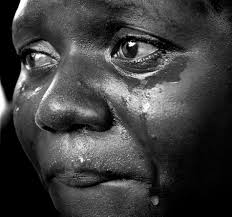'Suffering' is the subject of the Four Noble Truths. 'Suffering' refers to psychological or emotional trauma, including sorrow, lamentation, pain, grief & despair.
For example, when a woman is to give birth to a child, this event is often one of great anxiety, worry & physical pain, which is why the Four Noble Truths explain there is suffering associated with 'birth' (jatipidukkha).
Then for nine or ten months the mother shelters the embryo in her womb with great anxiety, as a heavy burden. Then, at the end of nine or ten months, she gives birth with great anxiety, as a heavy burden. MN 38
Similarly, aging, illness, death, separation from the loved, etc, are experiences of human suffering when human beings are tied up in these experiences with self-view (attachment).
Now at that time a certain householder's dear & beloved little son, his only child, had died. Because of his death, the father had no desire to work or to eat. He kept going to the cemetery and crying out, "Where have you gone, my only little child? Where have you gone, my only little child?" The Blessed One said: "That's the way it is, householder. That's the way it is — for sorrow, lamentation, pain, distress, & despair are born from one who is dear, come springing from one who is dear. MN 87
~~
Nakulapita went to the Blessed One and said "Lord, I am a feeble old man, aged, advanced in years, having come to the last stage of life. I am afflicted in body & ailing with every moment." The Blesssed One said: "'Even though I may be afflicted in body, my mind will be unafflicted.' That is how you should train yourself." Now, how is one afflicted in body & afflicted in mind? He assumes form (the body) to be the self, or the self as possessing form, or form as in the self, or the self as in form. He is seized with the idea that 'I am form' or 'Form is mine.' As he is seized with these ideas, his form changes & alters, and he falls into sorrow, lamentation, pain, distress, & despair over its change & alteration. SN 22.1
The causes of suffering, as explained in the 2nd Noble Truth & Dependent Origination, are ignorance, craving, becoming, attachment & self-identifying (self-view).
A Buddha or fully enlightened person has eradicated all suffering. A Buddha experiences no suffering in life whatsoever.
Below are pictures of suffering.


